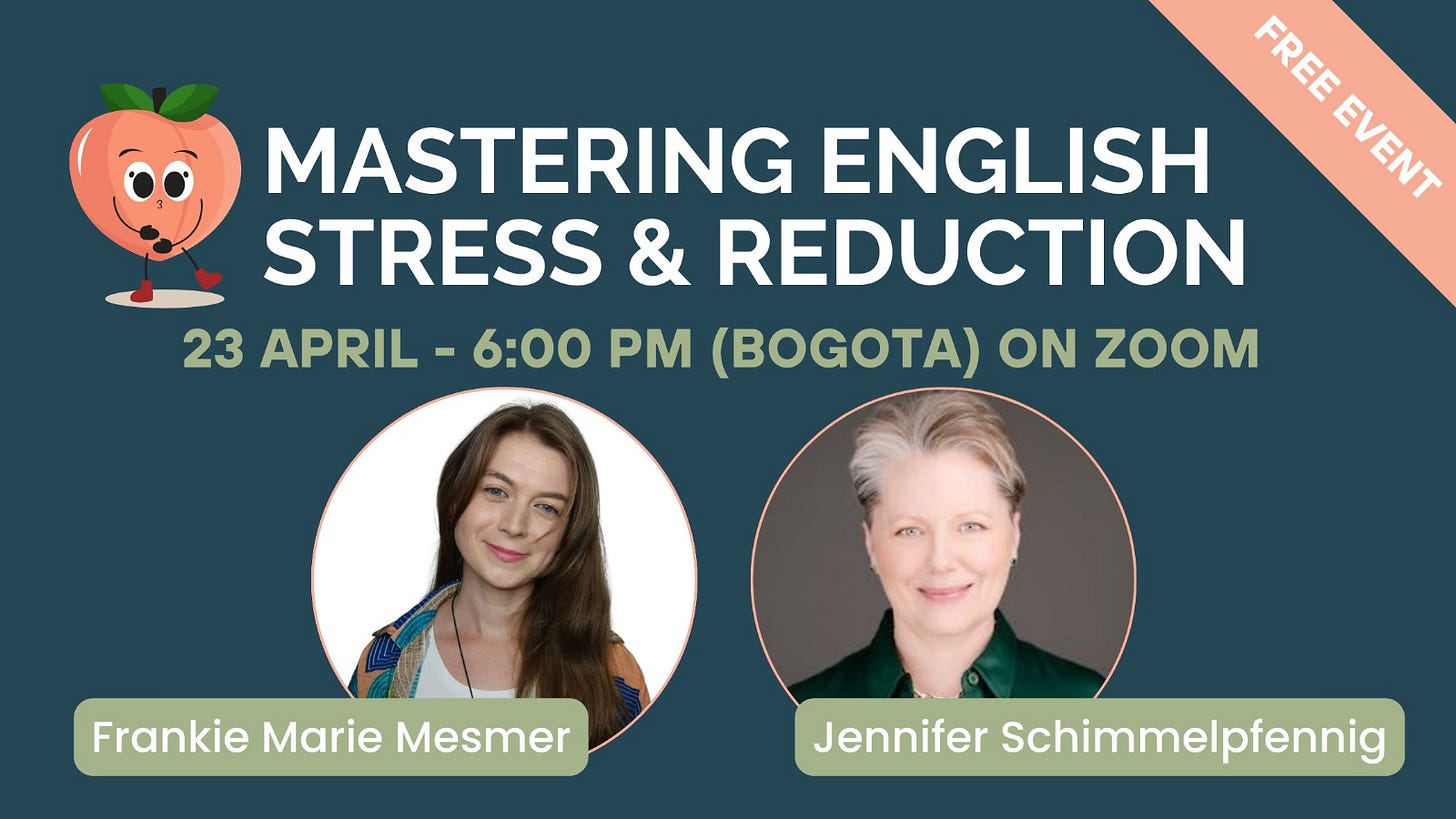The #1 Thing You Need to Know to Improve Your English Pronunciation
Learn about Prosody, Vowel Strees, and the Importance of Comprehensibility
Insights from Jennifer E. Schimmelpfennig, presented by Frankie Mesmer
🗣 Have you ever felt like you’re saying the words correctly, but people still struggle to follow what you mean?
You’re not alone… and there’s a good reason for this.
Most English learners focus on pronouncing each word correctly. But the real secret to sounding more natural and confident is learning how to be comprehensible.
Intelligibility vs. Comprehensibility
Intelligibility means the listener can understand your words.
Comprehensibility means they can understand you easily — without effort.
Both are important, but if your goal is to speak naturally, confidently, and clearly, you want to focus on comprehensibility.
How to Become More Comprehensible
The answer is rhythm and stress — what’s known as prosody.
English has a rhythm, like music. Some syllables are stressed (strong), and others are reduced (weak). This pattern gives English its natural sound.
When learners speak every word with equal force, it can sound robotic — even if every word is technically pronounced “correctly.”
English is Like a Staircase
Think of English like running up and down stairs. Some steps (syllables) are big and loud, and others are small and quick.
When we speak English naturally, we don’t give every word the same attention. Instead, we stress the most important words and glide over the rest.
For example:
“I WANT to GO to the STORE after LUNCH.”
Only the most meaningful words — want, go, store, lunch — are fully stressed. The rest are reduced and spoken more quickly.
This natural rhythm is what gives English its melody — and makes it easier to understand.
Stress is Your Most Powerful Tool
Every English word has one main stressed syllable.
When you stretch the vowel in that syllable, your speech instantly becomes clearer and easier to follow.
That’s why stress sits at the top of the Prosody Pyramid — it’s the fastest way to improve your pronunciation and comprehensibility.
Clear Vowels = Clear Communication
Vowels are the heart of every syllable. English has about 16 main vowel sounds, and they play a big role in how we understand one another.
When you stress a syllable, you’re really just stretching the vowel in that syllable.
Try it with the word banana:
We don’t say BA-na-na or ba-na-NA.
We say ba-NA-na — with the stress and longer vowel in the middle.
Know Your Vowels: Moving vs. Non-moving
Some English vowels glide — they start in one position and move to another. These are called diphthongs, or moving vowels.
Examples of diphthongs:
/aɪ/ as in “my”
/aʊ/ as in “how”
/ɔɪ/ as in “boy”
Other vowels stay in one place — we’ll call those non-moving vowels.
Examples of non-moving vowels:
/iː/ as in “see”
/e/ as in “bed”
/ʊ/ as in “book”
Knowing which type you’re using — and how it moves — helps you sound more natural and makes it easier for listeners to follow along.
🗣 Practice Tip: Stretch That Vowel!
Choose 5 common words and identify the stressed syllable.
Say each word slowly — and stretch the vowel in the stressed syllable.
Examples:
PHO-to
re-LAX
a-MA-zing
Notice how your voice rises and falls — you’re building rhythm and clarity! If you need some help, search the words at youglish.com.
🔑 Key Takeaways
If there’s one thing you can do to improve your pronunciation right now, it’s this:
👉 Focus on stress and vowel clarity in your speech.
You don’t need a “perfect” accent — you just need to be understood with ease.
When you learn to stress the right syllables and stretch the right vowels, your English will sound smoother, clearer, and more confident.
🎤 Join Us Live on April 23rd!
Want to practice this with a teacher? I’ll be hosting a special FREE live Zoom event on April 23rd with Jennifer E. Schimmelpfennig, an expert in prosody and English pronunciation.
Together, we’ll break down the concepts in this blog and show you how to apply them in your real-life conversations.







Thanks a lot, this article will help us a lot!